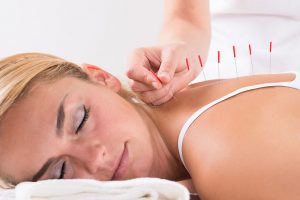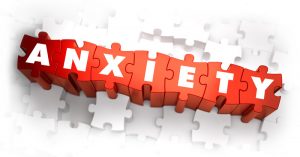Acupuncture Relieves Stress and Anxiety
 Acupuncturists and their patients have long realized that acupuncture offers a safe, effective treatment to relieve stress, anxiety, and depression. However, though the study and practice of acupuncture have existed for thousands of years, the treatment is only recently earning recognition from Western medical practitioners as a valid, effective treatment for a wide variety of health complaints, both physical and mental.
Acupuncturists and their patients have long realized that acupuncture offers a safe, effective treatment to relieve stress, anxiety, and depression. However, though the study and practice of acupuncture have existed for thousands of years, the treatment is only recently earning recognition from Western medical practitioners as a valid, effective treatment for a wide variety of health complaints, both physical and mental.
One of the reasons Western medicine took so long to seriously consider the effectiveness of acupuncture is the nature of scientific studies. To be considered valid research, scientists must meet a wide variety of conditions. Unfortunately, the very nature of alternative treatments, such as acupuncture, makes meeting these requirements nearly impossible.
Another factor making Western medicine pause is its inability to explain how acupuncture works, even as they recognize that it does work.
How Does Acupuncture Treat Stress and Anxiety?
The philosophy behind acupuncture tells us that there is a relationship between the elements, our emotions, and the body’s internal organs. If our emotions exert a physiological effect on our bodies, then it makes sense that we can affect emotions through physical stimulation of those same bodies.
Acupuncture recognizes five elements as representing five emotions:
- Earth = Worry
- Fire = Happiness
- Metal = Grief
- Water = Fear
- Wood = Anger
Each emotion invokes a variety of physiological responses. Anxiety’s physical symptoms include irregular heartbeat; it’s mental and behavioral symptoms include fear, irritability, and aggression.
Anxiety disorder diagnoses typically rely on which symptoms the patient exhibits. These disorders include generalized anxiety disorder (GAD), post-traumatic stress disorder (PTSD), and obsessive-compulsive disorder (OCD).
Back to acupuncture. In traditional medicine, anxiety is considered an imbalance between the heart and kidneys. The heart is fire, the kidneys water. When there is imbalance between the two, there is either too much or too little fire. Your acupuncturist treats anxiety by focusing on the meridian points near the heart, kidneys, ear, and spleen.
Acupuncture as Part of a Holistic Approach to Wellness
In addition to your acupuncture sessions, your acupuncturist works with you on incorporating sustainable lifestyle changes as part of a holistic approach to full-body wellness.
These changes include diet, exercise, and meditation practices that work well to calm the mind, reduce anxiety, and relieve stress. In addition, the treatment itself is highly relaxing and rejuvenating.
Please note that, if you currently take medication to manage your anxiety or depression symptoms, DO NOT cease taking these medications without the guidance and advice of your primary physician. Though the medications themselves include a disturbing level of side effects, abruptly ceasing them comes with serious risk. If your goal is to move forward into a life without the need of psychotropic drugs, please do so under your doctor’s care.
The Challenges of Acupuncture Research
Two of the most common psychiatric disorders are anxiety and depression, with anxiety topping the list, affecting over 15 million Americans every year, with double that amount struggling with anxiety during their lifetimes.
These disorders carry an enormous financial toll on society as a whole, and represent a significant drain on the world’s healthcare systems. What’s more, they are difficult to treat, with patients displaying a relapse rate of nearly 50 percent (one of the factors causing them to consider alternative treatments).
Researchers studying anxiety and depression recognize the impact on society and its peoples, as well as the challenges inherent in drug therapies. This has caused them to look more closely at alternative therapies, including acupuncture. However, the very nature of acupuncture makes it difficult for researchers to study using traditional, scientific method.
To be considered valid by the scientific community, research must include randomized control trials (RCT), as well as a broad base of subjects (sample size) taking place in the study. Both of these factors present difficulties in acupuncture studies.
Workaround #1: Develop Study Quality Measures
To help prove the efficacy of acupuncture, researchers created the Quality Score for Acupuncture Trials (QSAT). This system creates a series of uniform controls to address and improve the quality of acupuncture studies.
To be considered valid, acupuncture studies must meet the following 10 QSAT measures:
- Inclusion and exclusion criteria
- Study design
- Control treatment
- Sample size
- Randomization
- Blinding
- Acupuncture method
- Acupuncture treatment course
- Outcome measure
- Patients lost at follow-up
This method includes the quality expectations of all scientific study, while recognizing characteristics unique to acupuncture.
Workaround #2: Think Outside the Box to Broaden Your Sample Size
Sample size issues are the second highest complaint in acupuncture studies, and it makes sense if you think about. If you ask 10 random people in a store about their favorite X, that is a too-small sample size to get an accurate gauge of society at large.
Researchers with the Georgetown University Medical Center recognized the validity of this complaint and did what medical researchers have done for decades – used rats for their acupuncture studies. By using a large number of rats divided into numerous control groups, scientists were able to compare the efficacy of acupuncture treatment under scientific conditions.
What they discovered was a reduction in stress hormones in the blood of the rats receiving electronic acupuncture (chosen because of its uniformity – they knew each rat received the exact same dosage).
As studies like this continue to occur, expect to find more and more Western doctors prescribing acupuncture for their patients.
Qi flows through meridians, pathways that run throughout the body. This is Eastern medicine’s description of the chemical reactions your body regularly experiences. Environmental changes, injuries, stressors, and even poor nutrition may create interruptions in this flow. The result may be physical illness, pain, or even mental health disorders such as anxiety and depression.

Your acupuncturist restores proper flow by inserting acupuncture needles at the appropriate meridian points. Your body responds accordingly to restore healthy function, such as creating chemicals that help control pain or stimulating chemical reactions in the brain that support emotional balance.
What is Clinical Anxiety?
In the United States, anxiety disorders affect 15.7 million people each year, with 30 million experiencing clinical anxiety at some point in their lives.
Clinical anxiety differs significantly from the occasional bouts of nerves or anxiousness most people feel at some point
in their lives. Some experts relate these differences to the impact of migraines compared to people who endure
extreme headaches. Migraine sufferers experience nausea, extreme light-sensitivity, and an inability to function while in the throes of a migraine. In other words, if you have a headache but are still able to eat, move around, or sit in the sun or look at a computer or TV screen, you are not suffering from a migraine. In the same way, nervous tension and butterflies in the stomach are not indicative of clinical anxiety.
An individual with anxiety cannot manage the average person’s natural response to stress; they often feel overwhelmed almost to the point of panic. Symptoms vary, and the patient may present more than one. The patient’s response to triggers helps diagnose the disorder. Common symptoms include fear, irregular heartbeat, restlessness, negative thoughts, and aggression.
Anxiety disorders include generalized anxiety disorder (GAD), social anxiety disorder, obsessive-compulsive disorder (OCD), panic disorder, and post-traumatic stress disorder (PTSD). For some sufferers, the cause is genetic. For others, it may be due to a chemical imbalance.
How Does Acupuncture Treat Anxiety?
In acupuncture, the five elements – earth, fire, metal, water, and wood – correspond to and impact the body’s internal organs. In addition, these elements correspond to emotions:
- Earth and worry
- Fire and joy
- Metal and grief
- Water and fear
- Wood and anger
Acupuncture adherents recognize the connection between mind and body, including the physiological effect your emotions have on your body.
Your acupuncturist sees anxiety as an imbalance between heart and kidneys, with fire representing the heart and water representing the kidneys. Without balance, the water of the kidneys is incapable of containing the fire of the heart; the result is anxiety. Balance is restored by stimulating the points around the heart and kidneys, as well as the ears and spleen.
One of the ways acupuncture helps treat anxiety is through the practitioner’s methods, which include attentive listening to your symptoms in order to find patterns and determine the particular imbalance causing your symptoms. This contrasts greatly with Western medicine’s focus on treating symptoms while often ignoring the cause.
Studies on Treating Anxiety with Acupuncture
Though Western medicine is beginning to recognize the value of traditional and alternative medicines like acupuncture, it is still very much a world of referrals and word-of-mouth. Part of this is due to the nature of acupuncture itself, which resists the uniformity required by science-based research.
Acupuncture treatments vary by patient, depending on symptoms and patient history. Medical research requires large testing groups with a broad demographic base (i.e. variations in age, gender, occupation, and geography). It also requires uniformity in treatment, with a control group of comparable size to the treatment group. Meeting these criteria presents numerous challenges, particularly the uniformity in treatment requirement.
Despite these challenges, there are numerous studies proving the efficacy of acupuncture in treating anxiety. They are not definitive, but they suggest correlations in acupuncture’s ability to relieve anxiety.
The National Institutes of Health released the results of six separate studies of women treated with acupuncture after receiving a diagnosis of either clinical depression of clinical anxiety. The group also released a study on treating chronic stress with electroacupuncture. In all of these studies, acupuncture proved more effective than prescription drug therapy and even when compared to patients undergoing psychotherapy alone. In addition to improved treatment results, participants had a lower rate of remission (around 50 percent of anxiety patients go through remission once they end therapy or medication).
Studies like these have helped prove the power of acupuncture. As a result, many insurance companies now cover these treatments. To determine whether acupuncture is right for you, contact Accurate Acupuncture today.
